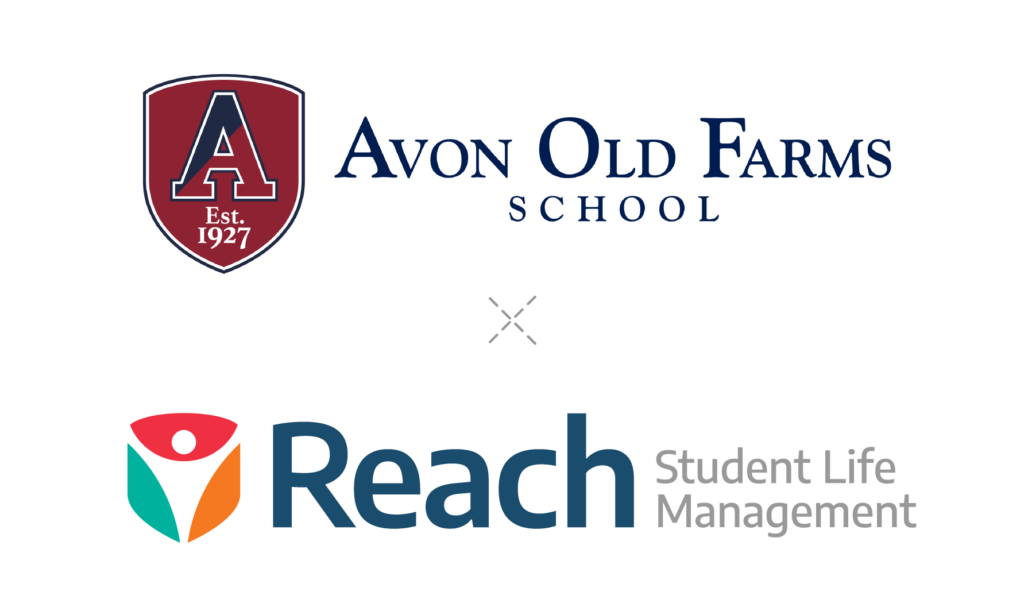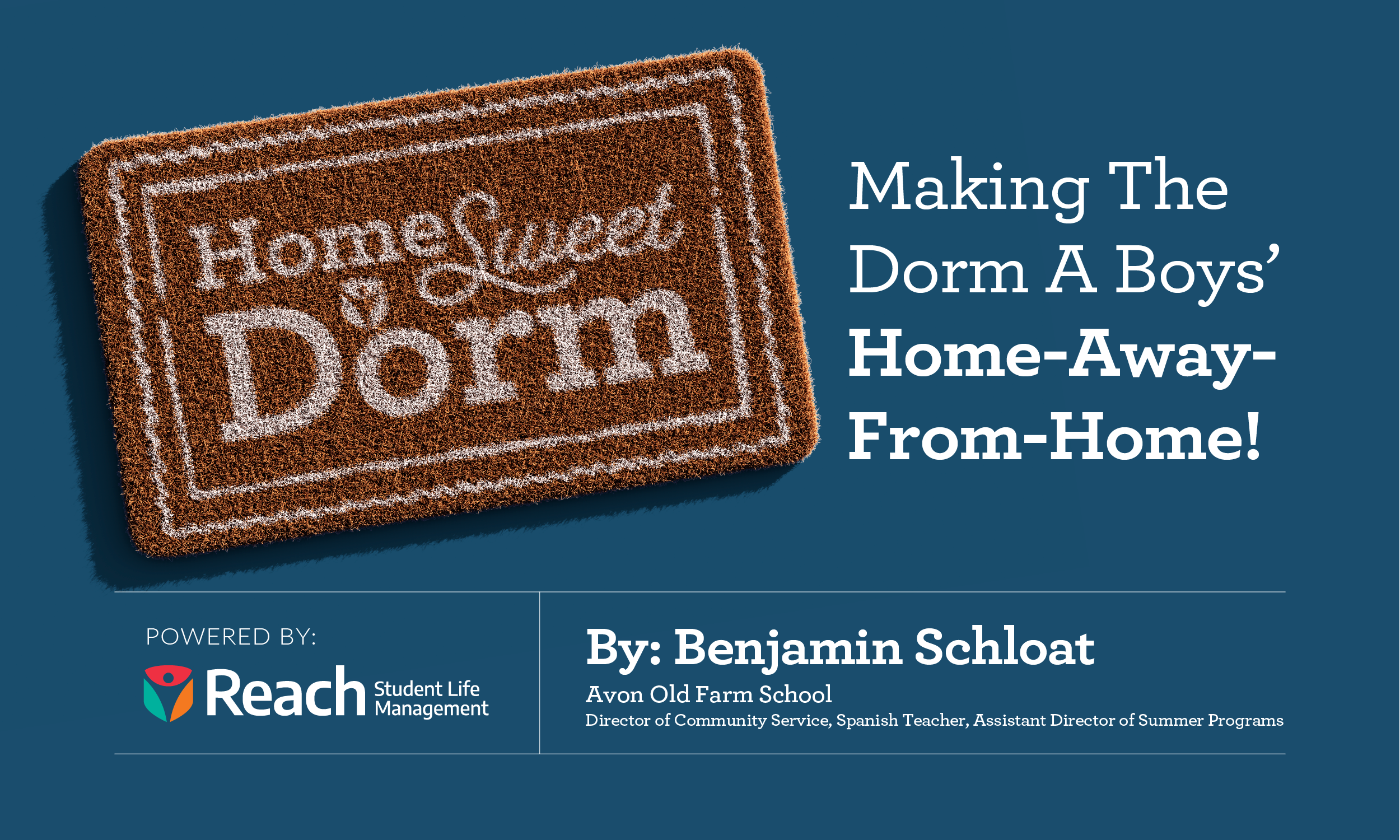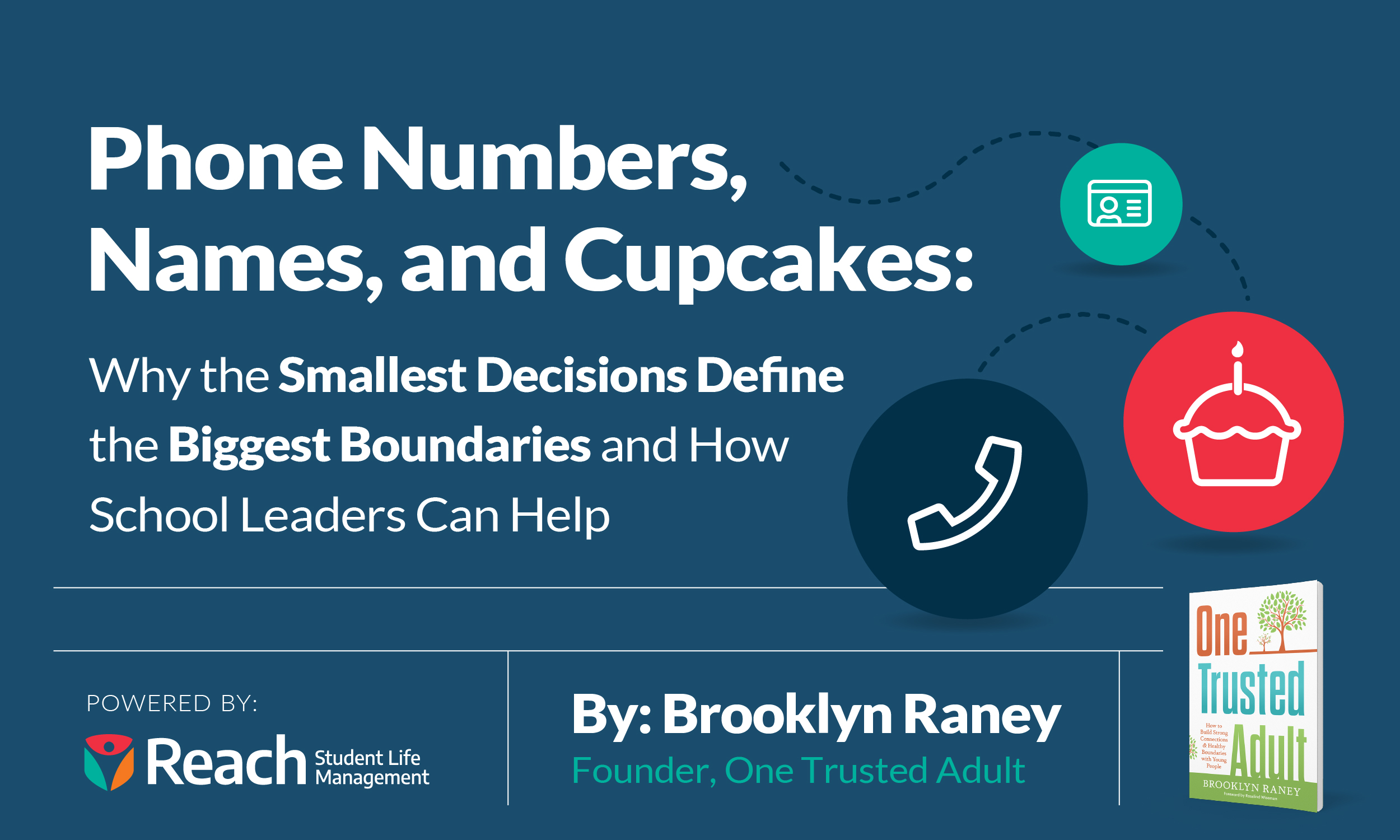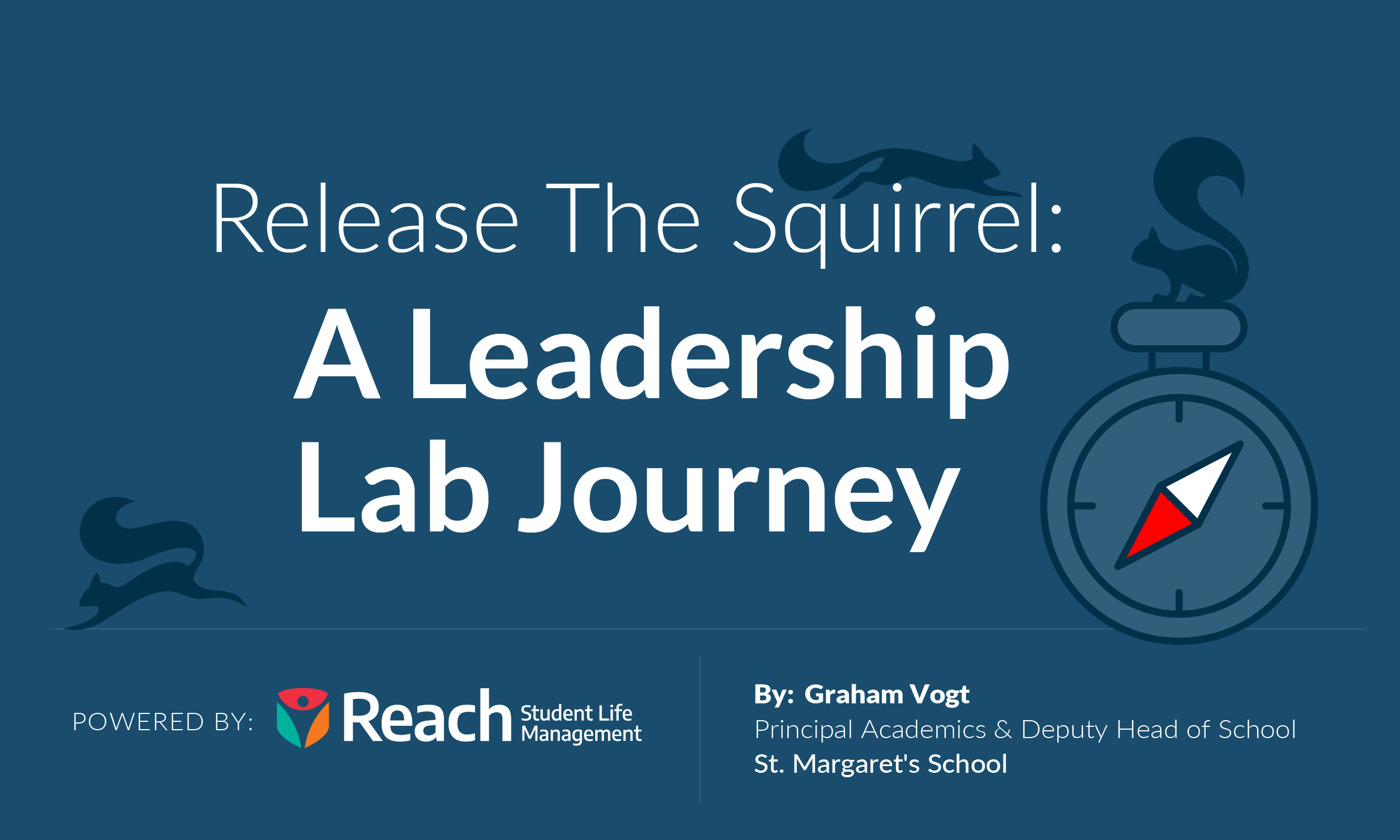By: Benjamin Schloat, Avon Old Farm School. Director of Community Service, Spanish Teacher, Assistant Director of Summer Programs.

From the moment a boy sets foot into his dorm room at the beginning of the school year, the dorm head is challenged to make the boy feel at home and to reassure parents that their sons will be well cared for. As a parent with a daughter in college, I understand the fear associated with dropping a child off to live under the care of a stranger. My goal as a head dorm parent is to create an environment where the boys will thrive; academically, emotionally, and socially.
In order for a boy to feel secure and to advance in a boarding school setting, there are four essential cornerstones of dorm life set into place:
Structure
In my eight years as a head dormitory parent, I have learned that while most adolescent boys don’t realize it, they actually flourish in more structured environments. We strategically establish the following structure in our dorms: standards for hygiene and room organization; study hall conditions (phone placed in the hall→door open→lights on→sitting at the desk); and morning wake up/evening lights out. Altogether, this framework of accountability contributes to a daily routine that has proven to be successful here at the CT boarding school for boys Avon Old Farms, into their college years, and out into the workforce.
Oftentimes, students will complain about the rigidity of the schedule or the rules designed to minimize distractions during study hall. What they don’t realize (yet) is that the good habits we’re training them to develop will translate to better academic results here and beyond. Countless alumni have claimed that organizing their time in college was easy based on the lessons they learned in our dorms. They watch their roommates struggle with time management, and look back on their time in study hall and see it for the beneficial program that it was/is.

Compassion
Each year, around 115 new boarding students join the Avon Old Farms private high school community. For many of those boys, this is their first experience away from home in a residential setting. They bring a variety of emotional responses: excitement, a sense of independence, fear, and homesickness. We structure our residential life program to fully incorporate each boy—new or returning—into the shared experience of cohabitation from day one.
We intentionally build the infrastructure for connection into everyday life. For example, the Big Brother mentor program pairs new boys with returning students so that incoming students have a guaranteed opportunity to network with boys who can empathize with what it was like to be in a new place away from home. Additionally, student monitors, upperclassmen, and leaders in the dorms come alongside new students to support their emotional wellbeing and an overall sense of Brotherhood on campus. A key aspect of student success is their relationship with their advisor; therefore, the role between student and advisor is given the space and devoted time it needs to grow into a nurturing and rewarding relationship.

Attention
Each boy who attends the New England prep school Avon Old Farms is different; however, there are many similarities between them as well. It’s imperative that we get to know each boy from the start of his time here in order to best assist him in his journey into adulthood. Daily interactions with the boys in the dorm and on campus allow the faculty to gain a better understanding of the boys’ personalities.
While on dorm duty I make it a point to stop into each room to check in with each boy individually. I’ll ask him about his day, sports, homework, social lives, interests, etc.—and then listen—because knowing the whole boy better equips me to guide and mentor him. Attention to every detail provides insight into why a boy is struggling in any area of his life; we understand that if he is experiencing trouble with a relationship, it can lead to a downward trend in academics, stress in the athletic arena, and can easily be carried over to the overarching social pulse in the school. Fortunately, the daily interactions that dorm parents have with the boys cue us into how we can bolster the emotional well-being of each student as he navigates life in a boarding school.

Presence
In his dorm, a student will interact with around five different faculty members on the dorm team: each faculty member is there to ensure that the boy will feel supported and equipped to succeed. Even beyond my assigned dorm duties, I like to go around the dorm in the evening to speak with each boy; ask him about his day, and to say goodnight—especially at the beginning of the year. This helps me to learn the boys’ names, and to get to know them. It also shows them that there is an adult presence, someone who cares about them and helps to keep them on the straight and narrow. A boy’s sense of confidence can propel him to achieve more in his classes and try new things, such as one of the many clubs on campus or a community outreach event … knowing he has the solid backbone of adult guidance will help him to feel even more secure in who he is and therefore expand more in the process.

Key Takeaway
For boarding students, the dormitory is their home away from home. Creating a safe environment where a boy will thrive is an awesome responsibility for a head dorm parent—a trust that we take seriously and intentionally at Avon Old Farms School. From the first day students arrive until the day they cross the stage at commencement, boys need to feel that they belong and that they are a part of the community. After years of living at a boarding school that provides structure, compassion, attention, and the consistent presence of adults, we know the boys are heading out into their next life stage equipped and ready to face new challenges head on.
At Avon Old Farms School, Reach plays a vital role in supporting the school’s mission of fostering a thriving residential life for boys. As a trusted partner in student life management, Reach provides tools that help streamline operations, enhance communication, and promote safety within the boarding environment. If your school is interested in learning how Reach can empower your residential life program, we’d love to connect with you.

Benjamin Schloat
World Languages Chairperson. B.A., Manhattan College. M.S., Quinnipiac University
Benjamin Schloat was raised in Westchester County, New York. At the young age of four, he was introduced to his roots: a family friend began to teach him Spanish around the same time that his parents shared with him that he was adopted, and that his biological father was Mexican American. Looking back, it’s easy to see why he was drawn to becoming a Spanish teacher; but the path was not a straight one.
“I was too young to understand the significance of pursuing the learning of Spanish, but I think the older I became, the urge to connect to a background that I otherwise could not reach grew stronger,” he shared. “In the beginning, I enjoyed learning Spanish because it was something I did that my older brother didn’t; I was winning that battle.”
In the fifth grade, when his school offered an after school Spanish class, Benjamin once more embraced the opportunity. This was serendipitous as a new student arrived that year from Colombia, and Benjamin helped him with his transition to American life. He also began to volunteer during school with the ARC program. In 1992 as a high schooler, Benjamin traveled to Málaga, Spain, and lived abroad with a host family for six weeks.
At the end of high school, Benjamin was accepted to Emory University, but decided his interests were not to continue his schooling. During his senior year of high school, he joined a volunteer ambulance corps, so his career led him in the direction of becoming an EMT for the next 15 years. As an officer in the volunteer ambulance corps he directed the response to the terrorist attacks on September 11, 2001, packing an ambulance full of supplies having them delivered to the staging area in Flushing, Queens.
“These experiences fostered in me a strong sense of volunteerism, which I bring to my position as director of community service.”
He also worked on a facilities team at a local independent day school and found a position of importance translating for the Spanish-speaking cleaning crew. He enjoyed the energy of being in a school setting and found a home there.
“One day, the head of the lower school approached me and said that she needed a Spanish teacher; she had heard me speaking Spanish around school and had observed how well I got along with the students, so she thought it would be a good fit. But, her boss said they could not hire me because I did not have a college degree. That was the push I needed.”
And so, 10 years after graduating from high school, he decided to pursue my degree in Spanish and Education at Manhattan College. During his time at Manhattan, he studied Spanish language and culture abroad at the Universidad Complutense de Madrid. He graduated Magna Cum Laude. Armed with his degree, he was hired to teach Spanish from 5th-12th grade at the Colton Pierrepont Central School.
“When I was a teenager in Spain, all the Spanish teens wanted to know how to pick up girls in English, not how to order a Coke at a restaurant,” he joked. “So, in class, I teach to my students’ interests as well as their egos a little bit. I explain to them that if they can speak another language, they’re now interesting to a whole new group of people… and when you’re bilingual, you’re a lot more interesting than the other people in the room who are not. I aim to make it fun and something they want to do.”
In 2010, Benjamin began to see the appeal of independent schools and began to apply for jobs throughout the northeast. Among others, Avon Old Farms was on his list of interviews. He liked the all-boys environment, and like many before him, fell in love with the campus and the culture.
“When I was a boy, I attended Camp Dudley in Westport, NY. The motto of the camp is designed to teach boys to be selfless. When I visited Avon Old Farms School in the spring of 2010 I recognized the similarities in the missions of AOF and Camp Dudley.”
That year, he moved to campus to begin teaching, mentoring, and coaching. He now lives on campus with his wife, Jennifer, daughter, Aurora, and son, William.
“I love the accountability that exists at a boarding school,” he shared. “I enjoy getting to know my students outside of the classroom, and I know that if I need to follow up with someone I can find them in the Refectory or in the dorm. I have the ability to check in with them and ensure they’re doing well.”
Benjamin also shared the rewards of being a teacher: seeing the boys who get it and buy in, after originally not wanting to be in class at all.
“I teach Spanish II, where I tell boys to stick with it; try it,” he explained. “Then when they finish the class, I challenge them to take Spanish III because if they get through that, they’ll have me again for Spanish IV. I love it when those kids show up on my Spanish IV roster.”
FUN FACTS:
- Benjamin is a foodie! He loves to try new foods and restaurants. He is also passionate about cooking.
- In the summer of 2020, Benjamin ran a virtual full marathon on the bike path near campus all on his own.
- He has sung at three weddings, gave a best man toast in Italian, and recited Spanish poetry at one.




